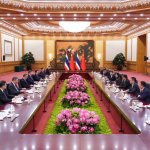
As Charles E Weller once wrote, “Now is the time for all good men to come to the aid of their country”. While the quote’s original purpose was just a typing exercise, it rings true on occasion, and especially now at a critical crossroads in Thailand’s fledgling semi-democracy. Twin trials await former Move Forward Party (MFP) prime ministerial candidate Pita Limjaroenrat later this month, both in the Constitutional Court, a judicial forum known for its past crippling of Thailand’s democratic opposition.
The first legal challenge relates to Mr Pita’s ownership of stocks in iTV, a media company that has long ceased operation and whose shares were inherited from his father. The second is an accusation that Mr Pita’s attempt to amend Article 112, known as the lèse-majesté law, was an attempt to overthrow the constitutional monarchy. Both could be dire for the democratic opposition as a whole, with Move Forward meeting the same fate as its predecessor, Future Forward, in dissolution.

While Mr Pita has expressed confidence in public, Thailand’s nascent democratic opposition has every reason to be concerned. A banned Move Forward Party would bring the kingdom’s chronic political instability back with renewed fervour, and the Pheu Thai Party, which made a grand compromise with the same military-backed party elites that overthrew two democratically- elected governments, would be increasingly vulnerable. This fissure should concern newly-minted Prime Minister Srettha Thavisin the most, although he and Pheu Thai leadership have shown little interest in standing up to the conservative establishment who are at the heart of both legal complaints.
Mr Srettha should fundamentally understand that both domestically and internationally, it would draw considerable attention to Thailand if he were to spend his political capital defending Mr Pita and Move Forward, but more explicitly, the immense value of a democratic opposition in a free society. At home, Mr Srettha has much to lose.
A NIDA poll in late December found that Thais still prefer Mr Pita as their choice for prime minister at over 39%, with Mr Srettha at just 22%, and Paetongtarn Shinawatra, daughter of former PM Thaksin, at under 6%.
If the Constitutional Court moves to ban Move Forward, Pheu Thai will suffer as well, as the electorate will forever remember this coalition government as a historic act of betrayal.
There would be little guarantee that at the next election, Pheu Thai would be able to guarantee a majority government in the vacuum created by Move Forward’s dissolution. Mr Srettha should also think about his own political future, as Ms Paetongtarn likely has an eye on the position herself, first as a potential cabinet member and also evidenced by recent analysis that suggested Thailand could be currently governed by “two (or more)” prime ministers.
Mr Srettha would do well to distance himself, and separate, the Pheu Thai Party from the shadow of the Shinawatras, the most divisive, controversial political family in contemporary Thai history. In a democratic society, the judiciary provides a check on executive and legislative power, but a tainted court warrants Mr Srettha’s use the power of the bully pulpit to advocate for a healthy democratic opposition.
Doing so would give credence to the notion of Thailand as an emerging democracy both at home and abroad. Distance from Thaksin also boosts Pheu Thai’s independence, as the reins of internal control are democratised, giving the electorate a reason to give it a second chance in the absence of a legitimate progressive alternative.
Mr Srettha’s advocacy would not come without some sacrifice or domestic controversy, as questions will be asked about the choice to form a coalition with military-backed parties or shun Move Forward’s earlier attempts at political reforms that would cripple the conservative establishment’s long-held control over Thailand’s quasi-democratic institutions.
So far, the prime minister’s appeal has been as a populist rather than as a statesman with democratic principles at the heart of his governing philosophy. Mr Srettha’s silence on the lawfare-related lèse-majesté convictions for activist human rights lawyer Arnon Nampa and Move Forward MP Rukchanok “Ice” Srinork is deafening.
Finally, Mr Srettha must also think about his own legacy. While crass commentary has accused the prime minister of being a “stooge” for his support of Isoc, a controversial military institution, his legitimacy as a “travelling salesman” for Thailand is in jeopardy, as his quest to boost Thailand’s soft power is intimately linked to the kingdom’s international reputation.
Soft power is highly dependent on three characteristics: the byproducts of culture, politics and foreign policy. Mr Srettha needs to consider the utility of giving voice to a characteristic that nationals from many Asian countries still seek, a free society, independent from authoritarian control.
If Mr Srettha’s primary goal is to attract others by the legitimacy of Thailand’s professed state values, the core aim of soft power, what good does allowing Mr Pita, former coalition partner and a well-regarded political figure, suffer at the whims of autocrats do for Thailand’s international reputation? Nothing. Soft power is easily negated by the use of hard power.
For the sake of his own legacy in history, Mr Srettha should risk as much of his political capital as possible to save Mr Pita, and by doing so, save the future of Thai democracy itself.






